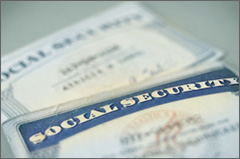EverSafe Scam Watch
Protecting Your Financial Health
Social Security Numbers Abused in Costly Identity Heist
Out of all your personal information, scammers often prize Social Security numbers most of all, and for a clear reason: The number is a key that can unlock a wide range of valuable financial data.
 In a recent dramatic example, two New York men have been indicted for stealing 17 Social Security numbers, which they then used in a scheme to raid their victims’ bank accounts. The scammers were able “to create a full identity profile for each (victim) – including driver’s licenses, bank statements, email addresses and more – then using the fake documents to apply for loans in the victims’ names, which they quickly withdrew and never repaid,” according to Brooklyn District Attorney Gonzalez.
In a recent dramatic example, two New York men have been indicted for stealing 17 Social Security numbers, which they then used in a scheme to raid their victims’ bank accounts. The scammers were able “to create a full identity profile for each (victim) – including driver’s licenses, bank statements, email addresses and more – then using the fake documents to apply for loans in the victims’ names, which they quickly withdrew and never repaid,” according to Brooklyn District Attorney Gonzalez.
“This was a calculated and shameless scheme,” said Jessica S. Tisch, New York City Police Department Commissioner. “These individuals allegedly stole identities, forged documents, and scammed lenders out of hundreds of thousands of dollars in fraudulent loans and COVID relief funds.”
Armed with Social Security numbers and other personal data, the thieves applied for debit cards and other forms of credit in their victims’ names, hauling in $416,000 before they were caught. “These defendants allegedly perpetrated a sophisticated scam that used stolen identities to defraud financial institutions,” Gonzalez said.
Given the appeal of Social Security numbers to scammers, it is important that people take steps to protect themselves. By doing so, you can significantly reduce the danger of fraud. Among the measures recommended by the Social Security Administration:
Create a personal Social Security account. This action, which can be taken online at www.ssa.gov, can prevent a scammer from creating a phony account in your name – even if they have learned your Social Security number.
Guard your Social Security number with care. Do not routinely carry your Social Security card. Be cautious about sharing your number, even when it is requested on a form. There is nothing wrong with asking why your number is needed and if it is really required in a transaction.
If you suspect a problem, consider blocking electronic access to your account. You may call the agency’s toll-free national number at 1-800-772-1213 (TTY number for people with hearing or speech difficulties is 1-800-325-0778).
Travel Season is the Time of Lost Baggage Scams
With summer travel ramping up, scammers are turning to social media to conduct a fraud involving the phony sale of lost baggage. The scam, which has been reported around the world, works like this: Fraudsters post ads online in which they offer to sell unclaimed luggage found at airports for very low prices. In a bid to appear credible, the ads  typically include photos of airports and baggage, suggesting that the seller is either an airport or an airline. But it is all a hoax. There is no baggage, and victims who answer these ads and send cash – lose it.
typically include photos of airports and baggage, suggesting that the seller is either an airport or an airline. But it is all a hoax. There is no baggage, and victims who answer these ads and send cash – lose it.
Geneva Airport recently cautioned the public that it never sells lost luggage but has found that “several fraudulent websites” were conducting the online scam in its name. In the Pacific island of Fiji, Nadi International Airport has warned travelers of the same scam. “If you come across this post, report it under fraud or scam to Facebook,” airport officials said. “We also wish to advise that this will be reported to relevant authorities.” Earlier this year, Heathrow Airport was also forced to deny it was selling unclaimed luggage to the public.
Airports in Denver, Chicago, Vancouver, Australia, New Zealand, The Philippines, and South Afrida have all been cited by scammers who were pretending to sell unclaimed luggage online.
On occasion, airlines may choose to sell unclaimed items. But the flurry of frauds on social media is a reminder that consumers must use extreme caution if they see such offers. Remember a basic truth about scams: If a deal sounds too good to be true, it usually is.
Older Adults Advised to Watch Out for Elder Fraud
 Fraud committed against older adults remains a major threat to financial security, according to the Better Business Bureau (BBB). The BBB’s Scam Tracker ranks cryptocurrency fraud, phony investments, online purchase fraud, and romance scams high up on the list of frauds aimed at older Americans.
Fraud committed against older adults remains a major threat to financial security, according to the Better Business Bureau (BBB). The BBB’s Scam Tracker ranks cryptocurrency fraud, phony investments, online purchase fraud, and romance scams high up on the list of frauds aimed at older Americans.
The good news is that elder fraud – and typically other scams, which may be aimed at young people – share certain features that should make consumers avoid them at all costs. Scam experts at the BBB warn the public to watch out for the following red flags of swindle:
- Purported “deals” that offer you something of real value for free.
- Requests for payment through wired funds or prepaid debit cards.
- Claims that all you have to pay is postage or administrative fees.
- Pressure to make a purchase right away, typically stated aggressively.
- Unnecessary requests for information about your credit card number or bank account.
- Promises that an investment cannot lose money.
- Claims that a charity will use 100% of your contribution for those who need it.
While many fraudsters target older adults, certain products may prove particularly tempting to aging consumers. Unsolicited offers for vitamins, anti-aging products, and medical supplies are among ways that scammers may attempt to deceive older adults, according to the BBB, which urges consumers to do their own homework before accepting a solicitation that turns out to be fraudulent.
“Before you agree to purchase the next miracle product that comes your way, take a few minutes to research the company to make sure its products and offers are legitimate,” the consumer group cautions.



